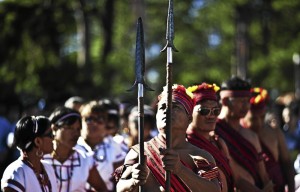Cordillerans ponder on autonomy

REPRESENTATIVES from Ifugao gather in Baguio City for the 25th founding anniversary of the Cordillera Administrative Region on July 15. The region, composed of six provinces and Baguio, is a product of the peace agreement forged by the government with slain rebel priest Conrado Balweg after the 1986 Edsa Revolution. EV ESPIRITU
BAGUIO CITY—This is a 25-year-old story so worn out from constant retelling that it begs for a proper ending.
Months after the 1986 Edsa Revolution, back-channel talks with the Cordillera Peoples Alliance (CPA) and civil rights groups from Baguio City led to the first post-martial law ceasefire between the government, led by President Corazon Aquino, and rebel priest Conrado Balweg.
The outcome of this peace-building process for Cordillerans was twofold—provisions in the 1987 Constitution that recognize indigenous peoples’ rights and the mandate for autonomous regions in the Cordillera and Muslim Mindanao, and Executive Order No. 220, which created the Cordillera Administrative Region (CAR) on July 15, 1987.
The CAR was tasked with preparing the upland communities for self-determination, and this should have been the fairy-tale ending to the Cordillera’s struggle for self-determination.
But in 1990 and 1998, the region’s leaders failed to convince residents to ratify two laws creating the autonomous government.
Article continues after this advertisementBalweg’s militia, the Cordillera People’s Liberation Army (CPLA), broke up into factions, regressing the progress made to disarm and disband the group. In the background, the CPA disowned any role in the government’s autonomy drive, saying it was subscribing to the “paramilitary interests of the CPLA” and was campaigning aggressively against the autonomy bills.
Article continues after this advertisementGood ending
Given these setbacks, writing a proper ending to the Cordillera story had consumed autonomy advocates. In 2006, the Regional Development Council (RDC) pursued “the unfulfilled constitutional provision” by formulating a third autonomy campaign. It said the region’s development needed an economic jolt that was not possible if it continued to operate only as an administrative region.
The RDC’s belief was strengthened when Aquino’s son, Benigno III, assumed the presidency in 2010. Virgilio Bautista, council cochair, often emphasized that destiny has come full circle for the region’s aspirations, and it is now up to the President to complete what his mother had started.
Congress is deliberating on House Bill No. 5595 and Senate Bill No. 3115, which seek a third organic act creating the Cordillera autonomous region. The measures allow the regional government to control its resources and oblige the national government to augment its yearly revenues with a P75-billion subsidy spread over 10 years.
Things to ponder
The bills have been crafted to pass Congress with little debate, taking lessons from the failure of the two autonomy bills and the model provided by the Autonomous Region in Muslim Mindanao (ARMM), upon which Mr. Aquino has forced reforms.
But there are more things to ponder before the rest of the Cordillera decide to accept or reject the bills.
Have we truly defined autonomy? Dr. J. Prospero de Vera III, University of the Philippines vice president for public affairs and faculty member of the UP National College of Public Administration and Governance, said none of the laws passed, including Republic Act No. 6734 (the ARMM law of 1987), has defined “autonomy” other than as “a description of certain types of political structures and arrangements, and most of the time … [as] a label used to describe different degrees of self-rule and shared-rule.”
Section 15, Article X, of the 1987 Constitution provides “a clear and categorical instruction that autonomy should happen,” De Vera said. However, he said, “the many concepts allow different groups to say we are champions of autonomy but they mean different things … and, therefore, consensus is very difficult to achieve.”
For the government, he said, the ARMM was a more marketable subject for autonomy because of the Tripoli Agreement of 1976, which defined the Moro territories seeking self-rule, and the centuries-old Moro struggle, which has been in the national consciousness for generations.
Curse of local autonomy. De Vera said the success of devolution has been both a blessing and a curse in the debate for autonomy. RA 7160 (Local Government Code of 1991) proved that “if you give responsibilities to local communities, they can do a brilliant job, if you trust them,” he said.
But he also said that efficient local governments have made autonomous governments irrelevant to some sectors.
Some autonomy issues have been resolved. De Vera said “some contentious issues have been set aside so a third autonomy bill should be easier to push in Congress.” He cited the passage of RA 8371 (Indigenous Peoples Rights Act of 1997), which resolves the pursuit for ancestral land rights.
Provide right reason for bigger funds. De Vera said: “Regional autonomy will gain momentum only if concrete and tangible benefits are derived from it. What can regional autonomy provide that local autonomy cannot give? [Otherwise] the regional government will be another bureaucratic layer … and will benefit only politicians who will have more positions to fill up for their supporters.”
He said the resources for autonomy “must be huge to make a difference,” and the proposed 10-year subsidy might be too small. The autonomous region’s ability to generate revenues must also be consistent with its responsibilities, he said.
Accept that self-rule is temporal. “[An autonomous government] is inherently a power of the central government, given to [the region], which means at any time, that power can be taken back by the state … Don’t expect to be liberated from the central government. That will never happen,” De Vera said.